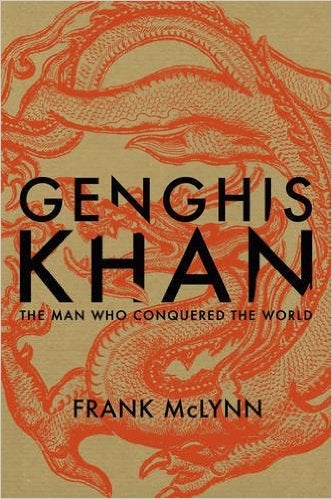Genghis Khan: The Man Who Conquered the World, by Frank McLynn - book review: A massive story badly told
Bodley Head - £25

If in doubt on any major matter of myth or history, the reader should turn to the greatest of great lexicons, the 1911 edition of the Encyclopedia Britannica. In it, Sir Robert Kennaway Douglas, sometime Keeper of the British Museum’s Oriental Books and Manuscripts, offers two whole pages to Genghis Khan (1162-1227 and spelled Jenghiz – a useful clue to pronunciation) as “one of the greatest conquerors the world has ever seen”.
With his heirs he briefly expanded his Mongol Empire from the coast of the Pacific Ocean to the outskirts of Vienna. It was never an Empire in any sense that we can understand; the Mongol armies were too small, too adventurous, too deadly and destructive to control it – they wiped out populations and their cultures and moved on and, from Peking to Budapest, it was a great relief when, after half a century, the conquerors had gone.
Now we have a new book written by a “highly regarded historian” who, alas, needed a sharp editor. With 646 pages it is too long, drifts into scarcely relevant excursions, has too few dates, too few illustrations and maps, and too much confusing information.
It attempts (but fails) to be a readable book, ending with the supposition that drought, cold weather and polar winds brought about the empire’s end, and, if not these, then moral turpitude. Most of all, it needed to include Genghis himself in its glossary of principal personalities, for his long, complicated, beastly and unpleasant life was so confusing that the average reader frequently needs a page of reference notes, instead of keeping a finger in the index pages or having the Britannica constantly at hand.
Dr McLynn admits he knows none of the eight essential oriental languages, nor the eight more that might have been helpful. He guides us on pronunciation – J as in jam, Ch as in church – but says nothing of the G other than that Genghis should really be Chingis, then observes that in the English-speaking world he was always Genghis, apparently unaware of the Britannica. His volume, he declares “is designed as popular history rather than an academic thesis”.
As popular history it has its moments, the numbers of dead and dying on all sides probably wildly inaccurate, the herds of horses and other beasts exaggerated beyond belief, the political genius of Genghis quite incomparable, and can we really believe that 60,000 Chinese virgins leapt from the walls of Peking rather than be ravaged by his troops?
There is no doubt that the Mongols sprang from a small core platform to the north of China, conquered everything and everyone within reach, subdued the great mass of China, Persia and all points between, reached the Caspian, the Black and the Baltic Seas and had Hungary in their grasp, all within two generations before they faded back into obscurity. It is a tale so vast that it is impossible to remember – hence the need for a new book, but perhaps not this.
Subscribe to Independent Premium to bookmark this article
Want to bookmark your favourite articles and stories to read or reference later? Start your Independent Premium subscription today.

Join our commenting forum
Join thought-provoking conversations, follow other Independent readers and see their replies